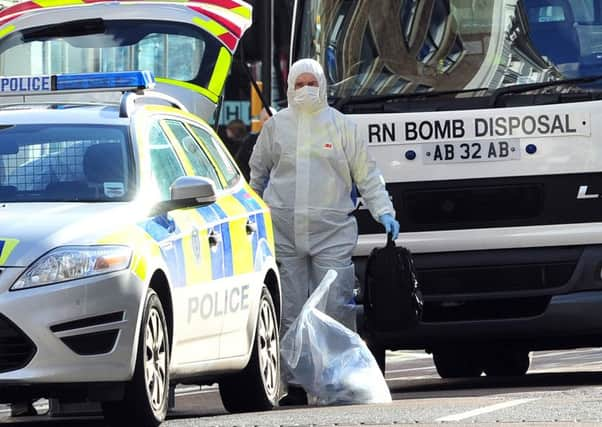Armed forces packages: ‘IRA’ claims responsibility


An organisation contacted a newspaper in Northern Ireland, using a recognised codeword, on Saturday, describing itself as the “IRA”. It warned attacks would continue “when and where the IRA sees fit”.
Four suspected explosive devices were discovered at army careers offices in Oxford, Brighton, Canterbury and the Queensmere shopping centre in Slough last Thursday.
Advertisement
Hide AdAdvertisement
Hide AdThis followed packages being sent to Aldershot, Hampshire, on Wednesday and another two on Tuesday to an armed forces careers office in Reading, Berkshire, and the army and RAF careers office in Chatham, Kent.
The IRA declared an end to its campaign in 2005 and disbanded over the subsequent years.
However, the New IRA formed just before the London Olympics in 2012 and was linked to letter bombs sent last autumn.
It is understood to be the main suspect in the latest incidents. One of the packages bore a Republic of Ireland postmark and Downing Street said the small but potentially viable devices bore “the hallmarks of Northern Ireland-related terrorism”.
Police have urged the public to remain vigilant. A Scotland Yard spokesman said: “We are aware of the claim of responsibility for the devices that were sent to army recruitment centres in England last week.
“The claim was received on Saturday, 15 February, by a Northern Irish media outlet using a recognised codeword. The claim was allegedly made on behalf of the IRA”.
The Irish News said it had received a statement saying: “The IRA claims responsibility for the explosive devices that were sent to British armed forces recruitment centres in England.
“Attacks will continue when and where the IRA see fit.”
Last week, Prime Minister David Cameron chaired a meeting of the UK government’s Cobra emergency committee to discuss the suspicious parcels, which sources said were “crude” but “could have caused injury”.
Advertisement
Hide AdAdvertisement
Hide AdSources in Dublin indicated that two of the seven low-grade explosive parcels were sent from Ireland. The others were thought to have been dispatched from different locations in Britain.
The official threat level for Northern Ireland-related terrorism is set separately for Northern Ireland and the rest of Great Britain.
In Northern Ireland, it is “severe” and in Great Britain “moderate”, meaning an attack is possible, but not likely.
The MoD was unable to confirm if security levels at military bases had been increased since last week’s incidents.
Britain’s current terror threat level from international terrorism is “substantial”.
Peter Geoghegan: Dissident republicans remain a threat to Northern Irish peace
The long history of Irish republicanism is littered with splits and mergers. The so-called New IRA – which has reportedly claimed responsibility for suspected explosive devices sent to army careers offices in England – was formed in Northern Ireland in early 2012 when the Real IRA, Republican Action Against Drugs (Raad) and a loose collection of independent republican groups came together under one umbrella.
The new group was responsible for the murder of prison officer David Black, in November 2012, and has also been implicated a series of attacks and bomb scares across Northern Ireland. Last week’s attacks suggest the group may be moving its focus to targets on the mainland, a familiar IRA strategy during the Troubles.
Advertisement
Hide AdAdvertisement
Hide AdDissident republicans opposed to the Good Friday Agreement have posed a continual threat and killed more than 50 people since 1998. However, they have struggled to sustain their campaign and are politically isolated.
The conditions that gave rise to the Troubles do not exist and nationalists now have a genuine stake in Northern Ireland. However, dissident republicans possess the resources and knowhow to remain a threat.
• Peter Geoghegan is author of A Difficult Difference: Race, Religion and the new Northern Ireland